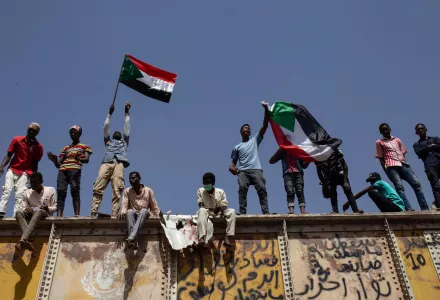Sudan in Crisis: Between Civil War and Military Rule
Professors Mai Hassan and Alex de Waal will discuss the current situation in Sudan with MEI Senior Fellow and former Prime Minister of Tuinisa Dr. Youssef Chahed.
Professors Mai Hassan and Alex de Waal will discuss the current situation in Sudan with MEI Senior Fellow and former Prime Minister of Tuinisa Dr. Youssef Chahed.

Professor Mai Hassan of MIT and Professor Alex de Waal of Tufts University will discuss the trajectory of events in Sudan from Bashir's ouster to the current state of the conflict with MEI Senior Fellow and former Prime Minister of Tunisia Dr. Youssef Chahed. This will be a panel discussion followed by questions from the audience.
Mai Hassan is an Associate Professor of Political Science at MIT. She is broadly interested in authoritarian regimes, bureaucracy and public administration, and contentious politics.
Her first book, Regime Threats and State Solutions: Bureaucratic Loyalty and Embeddedness in Kenya, examines how Kenyan leaders have managed the bureaucracy to achieve their political and policy goals. It was selected as a Best Book of 2020 by Foreign Affairs, won the American Political Science Association’s 2021 Robert A Dahl Award, and was the recipient of the African Studies Association 2021 Bethwell A. Ogot Award.
Professor Hassan’s research has been published in numerous outlets, including the American Journal of Political Science, Comparative Political Studies, and the Journal of Politics. She earned her PhD in Government from Harvard University. Before arriving at MIT, she was an Associate Professor at the University of Michigan. Professor Hassan was also an Andrew W. Mellon Foundation Fellow at the Center for Advanced Study in the Behavioral Sciences (CASBS) at Stanford University from 2019-2020.
Alex de Waal is the Executive Director of the World Peace Foundation. Considered one of the foremost experts on Sudan and the Horn of Africa, his scholarly work and practice has also probed humanitarian crisis and response, human rights, HIV/AIDS and governance in Africa, and conflict and peace-building. His latest book is Mass Starvation: The History and Future of Famine (Polity Press 2017). He is also he author of The Real Politics of the Horn of Africa (Polity Press, 2015), a full list of his publications is available below. Following a fellowship with the Global Equity Initiative at Harvard (2004-06), he worked with the Social Science Research Council as Director of the program on HIV/AIDS and Social Transformation, and led projects on conflict and humanitarian crises in Africa (2006-09). During 2005-06, de Waal was seconded to the African Union mediation team for Darfur and from 2009-11 served as senior adviser to the African Union High-Level Implementation Panel for Sudan, where he took on a number of roles in the negotiations leading to the independence of South Sudan. He was on the list of Foreign Policy’s 100 most influential public intellectuals in 2008 and Atlantic Monthly’s 27 “brave thinkers” in 2009.
Prof. Alex de Waal regularly teaches a course on Conflict in Africa at the Fletcher School, Tufts University. During this course, students should gain a deeper understanding of the nature of contemporary violent conflict in Africa. Students will be expected to master the key theoretical approaches to violence in Africa, and to become familiar with a number of important case studies. The focus is on the origins and nature of violence as well as policy responses and solutions. The course is inter-disciplinary and involves readings in political science, international relations, and social anthropology, while also touching on economics, environmental studies, and history.